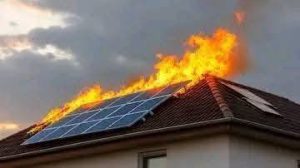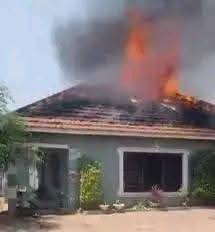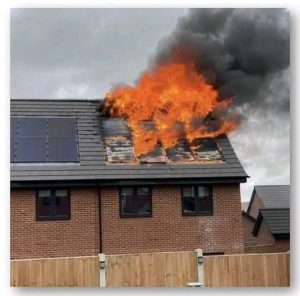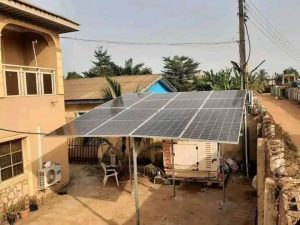Dangote vs. PENGASSAN: Another Day, Another Headache for Nigerians
September 29, 2025
Solar energy is one of the fastest-growing alternatives to traditional power in Nigeria and across the world. It promises cleaner electricity, independence from the unreliable grid, and long-term savings. But like every technology, solar panels are not without risks. One of the biggest concerns—often overlooked—is the danger of fire, especially when panels are mounted on rooftops.

The Hidden Dangers of Rooftop Solar Panels: Why they Catch Fire
Why Rooftop Solar Panels Catch Fire
- Faulty Installation
Most solar fires are caused not by the panels themselves but by poor installation. Loose wiring, substandard connectors, and lack of proper grounding can trigger sparks, which may lead to fire. - Low-Quality Materials
The market is flooded with cheap panels and inverters that don’t meet international safety standards. Using these products increases the chance of overheating and electrical faults. - Overheating and Arcing
When solar panels produce electricity, the system handles high DC voltage. If a connection is weak, it can create “arcs”—mini lightning flashes—that generate intense heat and can ignite nearby roofing materials. - Roofing Materials as Fuel
Many homes in Nigeria use wood, thatch, or low-grade roofing sheets. Once a panel or cable sparks, the roof itself can serve as fuel, spreading the fire quickly. - Difficulty in Firefighting
Firefighters often struggle to put out solar panel fires because the system remains live during daylight. Water can conduct electricity, making it dangerous to spray directly on burning panels.


Why You Should Care
- Family Safety: A roof fire can spread fast, leaving little time to escape.
- Property Loss: Solar fires often destroy the roof, ceiling, and other household items, causing huge financial loss.
- Insurance Complications: Some insurers may refuse claims if the solar system was not installed by certified professionals.

How to Protect Yourself
- Use Certified Installers: Always hire professionals trained in solar installation—not just any electrician.
- Buy Quality Equipment: Invest in panels, inverters, and batteries that meet global safety standards. Cheap is dangerous.
- Regular Maintenance: Schedule annual checks to ensure wiring, fuses, and connections are intact.
- Fire Safety Planning: Keep a fire extinguisher at home and know how to shut down your solar system in an emergency.
- Insurance Coverage: Confirm that your home insurance covers solar-related risks.
Solar energy is a smart investment, but safety should never be ignored. The push for renewable energy must go hand in hand with awareness of the risks. A single spark from poorly installed rooftop panels can destroy years of hard work in minutes.
Don’t gamble with your home or your family’s life go solar the safe way.



